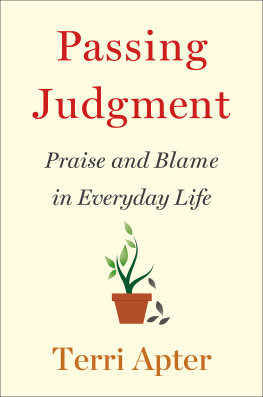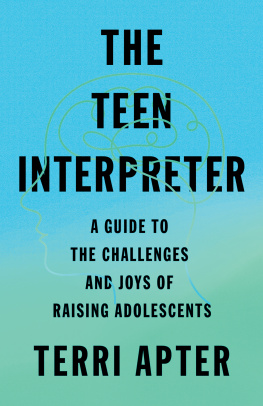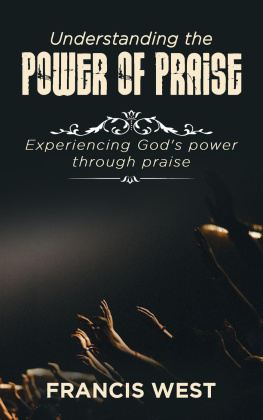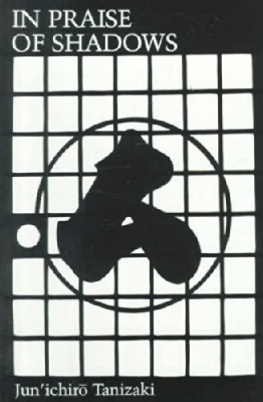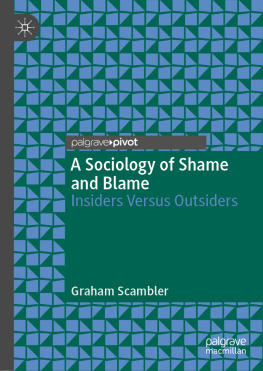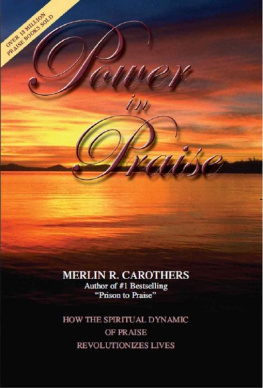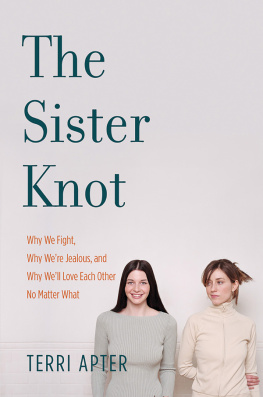
ALSO BY TERRI APTER
Altered Loves: Mothers and Daughters during Adolescence
Working Women Dont Have Wives: Professional Success in the 1990s
Secret Paths: Women in the New Midlife
The Myth of Maturity: What Teenagers Need from Parents to Become Adults
You Dont Really Know Me: Why Mothers and Daughters Fight and How Both Can Win
The Confident Child: Raising Children to Believe in Themselves
The Sister Knot: Why We Fight, Why Were Jealous, and Why Well Love Each Other No Matter What
What Do You Want from Me?
Learning to Get Along with In-Laws
Difficult Mothers: Understanding and Overcoming Their Power
PASSING
JUDGMENT

Praise and Blame
in Everyday Life
TERRI APTER

Names and certain characteristics of the individuals who are depicted in this book have been changed.
Copyright 2018 by Terri Apter
All rights reserved
First Edition
For information about permission to reproduce selections from this book, write to Permissions, W. W. Norton & Company, Inc.,500 Fifth Avenue, New York, NY 10110
For information about special discounts for bulk purchases, please contact W. W. Norton Special Sales at
specialsales@wwnorton.com or 800-233-4830
Book design by Helene Berinsky
Production manager: Anna Oler
JACKET DESIGN BY FRANCINE KASS
JACKET ILLUSTRATION GETTY IMAGES
ISBN: 978-0-393-24785-5
ISBN: 978-0-393-25410-5 (e-book)
W. W. Norton & Company, Inc.
500 Fifth Avenue, New York, N.Y. 10110
www.wwnorton.com
W. W. Norton & Company Ltd.
15 Carlisle Street, London W1D 3BS
For David
CONTENTS
PASSING
JUDGMENT
HUMAN INTERACTION between parents and children, within couples, among friends and colleaguesis permeated with praise and blame. Praise can be more restorative than food. Blame can wound and humiliate, stripping us of dignity, pride, and pleasure. Our experiences of praise and blame range far beyond specific compliments and complaints; we respond positively or negatively, with approval or disapproval, to facial expressions, eye movements, small wordless vocalizations, and physical gestures. Generally without being fully aware, we engage with praise and blame in every personal interaction.
In the first milliseconds of perceiving something we not only automatically process information about what it is, but we form an opinion, positive or negative.
Over time, as societies became more complex, the human brain evolved more subtle, probing, and varied appraisals. We remain interested in assessing whether someone is dangerous or trustworthy, but we also have more sophisticated social concerns: whether someone would understand our problems and predicaments, whether we are on the same wavelength, whether we would enjoy eating, talking, joking, debating with someone, and whether he or she responds positively to us. Here also, two systems of judgmentapproach and avoidance, approval and disapprovalshape our thoughts, emotions, and behavior.
EACH morning begins with a tally of whats positive and whats negative in the people around us. My husband quietly mounts the stairs and, without speaking, hands me a mug of steaming coffee. I am thinking about my early morning meeting, the weather, and the rain gear Ill need, but these give way to a sudden rush of praise. He is wonderful, I think and he acknowledges this unspoken judgment with a fleeting smile. The warm mug that I hug with my hands, anticipation of the first stimulating sip of coffee, my favorable bias toward my husband, the comfort I take in his understanding of my tight schedule and my caffeine craving trigger a bundle of responses that can be translated as praise. But when he turns up the volume of the radio, I feel more than irritation. There is a rush of blame: He should know how unpleasant this is to me. For a moment I tense and the accusationHe is so inconsiderate!hovers at the rim of consciousness. This must be expressed in the set of my mouth and eyes, for he raises his eyebrows. A silent query, tinged with humor and self-defense: What have I done wrong now? flickers across his face; then, after a minute tightening of his lips, he turns down the sound. My annoyance evaporates.
I go downstairs to the kitchen and step in as overseer of teenage daughters. There is a pulsing pleasure in the presence of these girls: They are wonderful , I think, but the halo surrounding their familiar faces, bodies, movements, and smell gives way to other responses. They are so careless, so messy, I think, as I look at the kitchen table, with its clutter of books and bags, spilled cereal, and uncovered jam, and the sticky river of juice encroaching on my papers. Before I articulate a complaint, the thirteen-year-old puts a bowl in the sink and my focus shifts. I wonder if she has really eaten anything. Our eyes meet, and I see that she is overwhelmed by some anxiety. Whats up? I ask. I try to be neutral, knowing how easily she is offended by excessive maternal concern. Her voice is a high-pitched, childlike whine, and she launches into a narrative I cannot follow, but the gist involves conflicting demands of friends and anxiety that one will judge her as a bad friend. I try to minimize her concern over such a negative judgment (You cant be serious! Who could possibly accuse you of that?) but she counters with her own accusation, You dont even try to understand. Then her forehead folds like rumpled silk; a whimper is buried in a hug, because she regrets her harsh judgment of me and worries that it may make her look bad. The sixteen-year-old observes this with faux detachment: Typical, she declares, hugging her sense of superiority close. As we prepare to leave the house, she is slow to locate her shoes and then asks me to sign a stained and very long document I have never set eyes on before. I tell her she is disorganized and wonder anxiously whether she is also being devious (Is there something untoward about the form that I have no time to read?). For a moment accusations thicken the air, until we exchange the glances of mutual love that each of us experiences as a primitive form of praise.
FOR over three decades I have been fascinated by the human obsession with praise and blame, and the central role it plays in our relationships. This fascination was awakened when, as a junior research assistant, I recorded interactions of infants with their mothers.months on, in the second phase of the study, the infants probing gaze was full of expectation. There was a need beyond food and warmth, even a need beyond love; it was a need for love that also conveyed, You are delightful and admirable. An infants despair at failing to secure admiration was overwhelming; the wails signaled a primitive terror, as though of abandonment and danger, even when the infant remained safe in a parents arms.
The primitive stake in others approval and disapproval is gradually absorbed into more complex understandings about cause and effect. By the age of three years, a child has developed a sense of his or her agency. The thrill of being able to do things by myself, and being praised accordingly is countered by the terror of doing bad things, and being blamed for the consequences. When my research took me to a new decade of developmentfrom five to fifteen years I saw just how much energy children devote to noting and trying to manage others judgments. As children were exposed to commonplace discipline from parents and teachers, the possibility of being blamed for something was a daily fear. Even as they developed a broader context of bad things and learned, for example, that breaking some thing is different from harming some one , and that there are levels of severity in harm, being blamed for anything at all, even just for talking too loudly or being a nuisance, lowered their mood and self-esteem. Being told that they did well or were very good, even if it was only for sitting quietly or eating a meal, elicited a body-filled grin and rush of delight.
Next page
